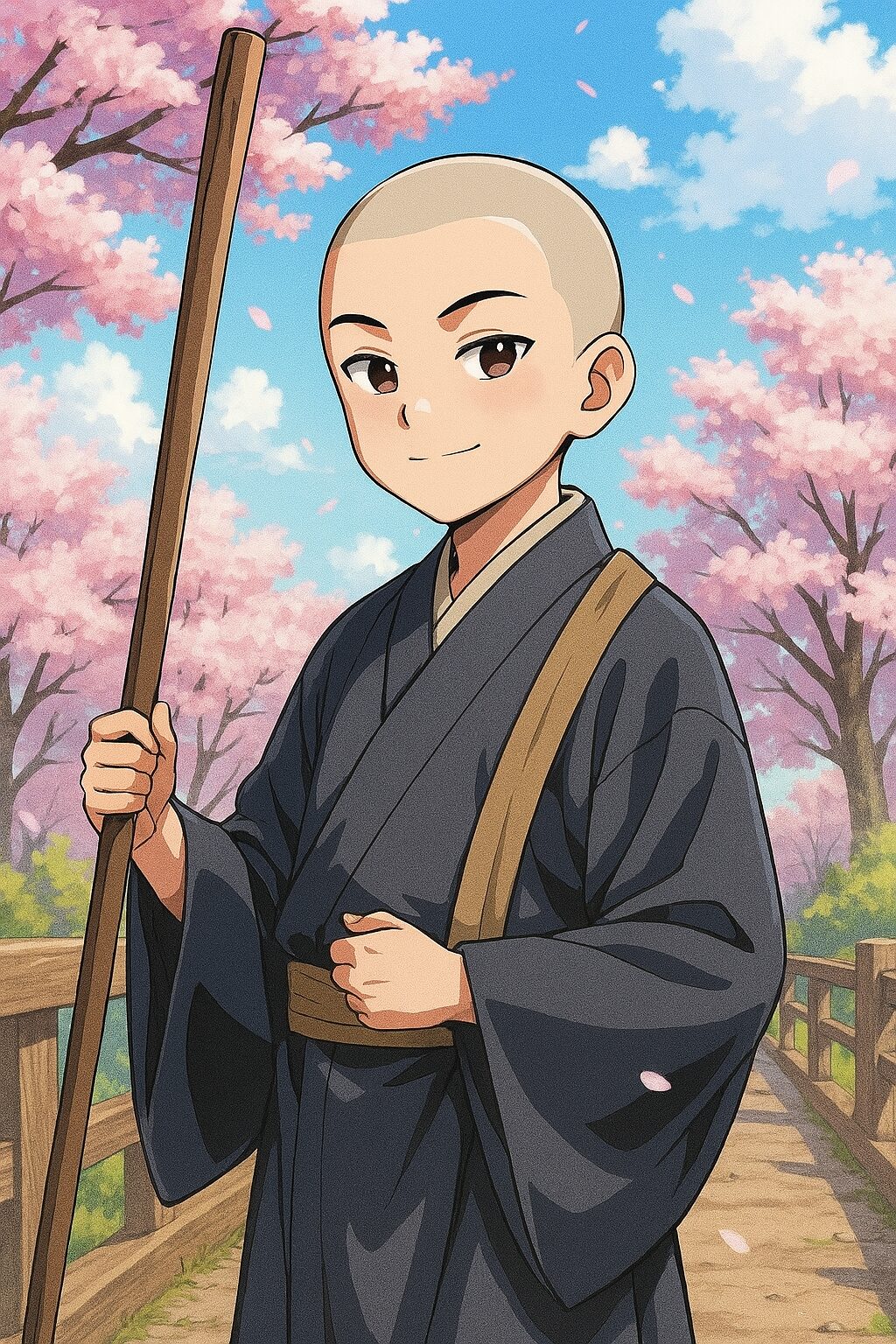- Introduction: Why Ikkyu Still Captivates Us Today
- Life of Ikkyu Sojun: A Monk Who Broke All the Rules
- Witty Tales: Ikkyu’s Clever Solutions to Impossible Problems
- Zen Philosophy: The Heart of Ikkyu’s Teachings
- Ikkyu’s Famous Words: Wisdom That Resonates Today
- Why Ikkyu Still Matters: Lessons for the Modern World
- Learn More About Ikkyu
- Conclusion: Ikkyu’s Free Spirit and Deep Insight
- はじめに:一休さんはなぜ今も語り継がれるのか?
- 一休宗純の生涯:破天荒な禅僧の軌跡
- とんち話:一休さんの知恵とユーモア
- 禅の思想:一休さんの行動の根底にあるもの
- 一休さんの名言:心に響く言葉たち
- 一休さんと現代:なぜ今も人気なのか?
- 一休さんをもっと知るための外部リンク
- おわりに:一休さんから学ぶ「自由な心」と「深い知恵」
Introduction: Why Ikkyu Still Captivates Us Today
Japan’s history is filled with extraordinary figures, but few are as unconventional and beloved as Ikkyu. More than just a character in folktales, Ikkyu Sojun was a real Zen monk who lived during the chaotic Muromachi period (14th–15th century). His sharp wit, rebellious spirit, and deep insight into human nature continue to inspire people across generations.
Life of Ikkyu Sojun: A Monk Who Broke All the Rules
Birth and Background: Born in Kyoto in 1394, Ikkyu may have had imperial lineage, possibly as the son of Emperor Go-Komatsu. Despite this, he lived a humble life and entered Buddhist training at a young age.
Training and Enlightenment: By his twenties, Ikkyu had achieved enlightenment. He questioned the rigid rituals of institutional Buddhism and preached from the perspective of ordinary people.
The “Rule-Breaking” Monk: Ikkyu drank sake, ate meat, and had romantic relationships—actions considered taboo for monks. But these were not acts of defiance; they were expressions of his belief that true understanding lies beyond superficial rules.
“If you meet the Buddha, kill the Buddha. If you meet the patriarchs, kill the patriarchs.” — Zen saying embraced by Ikkyu
Witty Tales: Ikkyu’s Clever Solutions to Impossible Problems
- The Tiger in the Folding Screen: A lord asked Ikkyu to catch a painted tiger that was “rampaging” in a screen. Ikkyu replied, “Then please let the tiger out, and I’ll catch it.”
- Don’t Cross the Bridge: Ordered not to cross a bridge, Ikkyu walked along the edge (hashi), cleverly obeying the command while still crossing.
- Buy Salt Without Money: Told to buy salt but given no money, a disciple hesitated. Ikkyu said, “Then return without buying it.”
These stories reflect Ikkyu’s ability to challenge assumptions and reveal deeper truths through humor and logic.
Zen Philosophy: The Heart of Ikkyu’s Teachings
Zen Buddhism emphasizes direct experience and awareness of the present moment. Ikkyu embodied this through his actions and teachings, rejecting empty rituals in favor of living truthfully.
- Koan: Paradoxical riddles that provoke insight beyond logic
- Zazen: Seated meditation to calm the mind
- Everyday Enlightenment: Finding wisdom in daily life, not just temples
Ikkyu’s Famous Words: Wisdom That Resonates Today
“I don’t want to die. I don’t want to die. I don’t want to die.” — Ikkyu’s final words
“The New Year pine is a milestone on the road to the afterlife. Joyful, yet not joyful.” — A poem on impermanence
“Among all things in this world, nothing blooms and smells as beautifully as the human heart.” — A tribute to human emotion
Why Ikkyu Still Matters: Lessons for the Modern World
Ikkyu’s life offers timeless lessons:
- ✅ Live authentically
- ✅ Question conventions
- ✅ Use humor to overcome hardship
- ✅ Seek the essence, not appearances
In today’s fast-paced, information-heavy world, Ikkyu’s wisdom reminds us to pause, reflect, and think for ourselves.
Learn More About Ikkyu
- Ikkyu-ji Temple in Kyoto (Official Site)
- NHK for School: Ikkyu-san Anime
- Wikipedia: Ikkyu Sojun
- What Is Zen? (Myoshinji Temple Official Site)
Conclusion: Ikkyu’s Free Spirit and Deep Insight
Ikkyu’s story is more than folklore—it’s a guide to living with clarity, courage, and compassion. His playful wisdom and fearless honesty continue to inspire those seeking meaning beyond rules and appearances.
Whether you’re exploring Japanese culture or searching for timeless truths, Ikkyu’s legacy offers a bridge between past and present, East and West.
🧘♂️一休さん:とんちと禅で時代を超えた知恵者の物語
はじめに:一休さんはなぜ今も語り継がれるのか?
日本の歴史には、型破りでありながら人々の心を掴み続ける人物がいます。その代表格が「一休さん」です。彼は単なる昔話の主人公ではなく、実在した禅僧・一休宗純であり、室町時代の混乱期にあって、常識を覆す言動と深い洞察力で人々を魅了しました。
一休宗純の生涯:破天荒な禅僧の軌跡
誕生と出自:1394年、京都に生まれた一休宗純は、皇族の血を引いていた可能性があると言われています。幼少期から仏教の修行を始め、臨済宗の道を歩みました。
修行と悟り:20代で悟りを開いた一休さんは、形式的な仏教儀礼に疑問を持ち、庶民の目線で仏教を説きました。
破戒僧としての側面:酒、肉、女性との交際など、当時の僧侶としては異例の行動を取った一休さん。しかし、それは「本質を見抜くため」の行動でした。
とんち話:一休さんの知恵とユーモア
- 屏風の虎:「虎を屏風から出してください。そうすれば捕まえます。」
- 橋を渡るな:橋の端(はし)を歩いて渡ることで命令を守る。
- 塩を買いに行け:「お金がないなら、買わずに帰ってこい。」
禅の思想:一休さんの行動の根底にあるもの
禅とは、「今この瞬間の気づき」を重視する仏教の一派です。一休さんは、形式よりも実践を重視し、日常の中に悟りを見出しました。
- 公案(こうあん)
- 坐禅(ざぜん)
- 日常の中の悟り
一休さんの名言:心に響く言葉たち
「死にとうない。死にとうない。死にとうない。」
「門松は冥土の旅の一里塚 めでたくもあり めでたくもなし」
「世の中に 人の心の花よりも 咲きでて匂う ものぞなきかな」
一休さんと現代:なぜ今も人気なのか?
一休さんの生き方は、現代の価値観にも通じます。自分らしく、常識にとらわれず、ユーモアを忘れずに生きる姿勢は、今の時代にも必要な知恵です。
一休さんをもっと知るための外部リンク
おわりに:一休さんから学ぶ「自由な心」と「深い知恵」
一休さんの物語は、形式にとらわれず、自分の頭で考え、ユーモアを忘れずに生きる姿勢を教えてくれます。彼の言葉や行動には、現代人が忘れがちな「本質を見る力」が宿っています。



コメント